|
|
|
Sort Order |
|
|
|
Items / Page
|
|
|
|
|
|
|
| Srl | Item |
| 1 |
ID:
144160
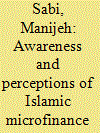

|
|
|
|
|
| Summary/Abstract |
This study examines the level of awareness and sources of demand for Islamic microfinance among the clients of microfinance institutions in Kyrgyzstan and Tajikistan. The research question is whether the source of demand is based on religious beliefs or the assumption of interest-free Islamic-compliant products. The field research uses a sample of 150 clients of several conventional microfinance institutions in these two countries. Although many analysts still maintain that there is a demand for Islamic microfinance in many parts of the world, the current qualitative and quantitative research indicates no clear demand for these products in these two countries. The relevant question for future research is whether microfinance users will demand Islamic microfinance instruments.
|
|
|
|
|
|
|
|
|
|
|
|
|
|
|
|
| 2 |
ID:
144166
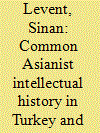

|
|
|
|
|
| Summary/Abstract |
This article proposes that Turanism played similar roles in Turkey and Japan in terms of forming a common Asianist thought, which can also be considered an anti-Western intellectual notion. Central Asia was depicted as irredenta, and Turanists in each country dreamed of independence for Turan-origin people in the region. Some of them even took action, as seen in the examples of Imaoka and Enver Pasha. Russia, as a member of the West, was othered in both countries. Togay, as a Russian Turkic-origin thinker, believed that Japan was a Turan-origin country, which had potential to dispose the Russian influence on Turkic people, which could enable their independence. Apart from Russians, Han Chinese played the villain's role due to the Mongolian, Manchurian, and East Turkestan questions. Turanism, which has been almost forgotten today, formed a common Asianist intellectual root in Turkey and Japan in the first half of the twentieth century.
|
|
|
|
|
|
|
|
|
|
|
|
|
|
|
|
| 3 |
ID:
144159
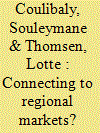

|
|
|
|
|
| Summary/Abstract |
Central Asian food processors face a number of constraints when they attempt to export to the region and beyond. The Central Asian economies in focus here are landlocked, and thus lack easy access to sea transport. In addition, the region's transport network was built to reinforce the interdependence of the then Soviet republics, while conflicting economic interests make cross-border cooperation difficult. Based on extensive fieldwork on infrastructure systems and firm export strategies, this paper identifies contemporary infrastructure and transportation issues within the Central Asian region, and makes a novel attempt to examine how these factors lead to challenges for local food processing producers trying to sell their products in the region and beyond.
|
|
|
|
|
|
|
|
|
|
|
|
|
|
|
|
| 4 |
ID:
144158


|
|
|
|
|
| Summary/Abstract |
An expanding body of literature in the field of Central Asian studies has brought attention to the problems of considering the region's complex dynamics through the lens of its nation-states. Comparatively less attention has been paid to the role played by trans-regional circulations in connecting parts of Central Asia to the wider world. This paper situates ethnographic work on trans-regional networks of Afghan traders in China, Central Asia, Russia, Ukraine and the UK in relation to the literature on trans-regional connections and circulation societies. Ethnographically it demonstrates the multi-polar nature of these trans-regional networks, and the importance of trading nodes, especially the Chinese city of Yiwu, to their formation and ongoing vitality.
|
|
|
|
|
|
|
|
|
|
|
|
|
|
|
|
| 5 |
ID:
144161


|
|
|
|
|
| Summary/Abstract |
While in the international literature water sharing in the Syr Darya Basin per past agreements is widely portrayed as most benefiting Uzbekistan, here the dynamics of water allocation within small transboundary tributaries in Ferghana Province show Uzbekistan as benefiting least. The case study highlights that water allocation for Uzbekistan within the tributaries has decreased over the years. Uzbekistan's approach to compensate for the reduced allocations by means of other water sources has had large long-term cost implications for irrigated agriculture as well as the irrigation bureaucracy. This article contributes to the international debate on benefit sharing in transboundary rivers. The article highlights that costs should be incorporated into the benefit-sharing approach, and therefore the focus on benefit sharing alone is misguiding riparian states. Furthermore, the article raises the need to reevaluate benefits, since perceptions of potential benefits change over time.
|
|
|
|
|
|
|
|
|
|
|
|
|
|
|
|
| 6 |
ID:
144162
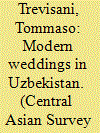

|
|
|
|
|
| Summary/Abstract |
Under the new conditions of independence, wedding ceremonies in Uzbekistan have increasingly diversified along growing social and economic divides. Recent state measures to curb ritual expenditures follow the furrow of a long tradition of criticism against ritual prodigality which, however, falls short of its self-set target of enforcing more ‘rational’ rituals. Based on fieldwork conducted in the Ferghana Valley, this paper sheds a new light on the controversy around ‘excessive ritual expenditures’ by discussing tensions in local practices arising from changing livelihoods and consumption patterns, on the one hand, and, on the other, from an ambivalent state policy that aims at containing ritual expenditures and social polarization, while also promoting an ideal of modern wedding that undermines the very aim of the policy.
|
|
|
|
|
|
|
|
|
|
|
|
|
|
|
|
| 7 |
ID:
144165
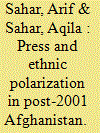

|
|
|
|
|
| Summary/Abstract |
This article analyses the contents of three newspapers affiliated with the Tajik-dominated Jamiat and Shura-e-Nezar factions that were deployed during the 2014 presidential election to publicize ethno-political polarization for instrumental ends. The practice of nurturing ethnic identities serves as a microcosm of the broader context in which identity politics, besides coalition-building, rent-seeking, and patrimonial interdependencies, has become a key feature of post-2001 politics. This article focuses on how these factions used these newspapers to polarize ethnic cleavages to win legitimacy for themselves and defamation for their Pashtun-dominated rival factions – Hezb-e-Islami Gulbuddin and the Taliban. It will be years before the ethnic mujahedeen and muhajereen and the new generation reach a mutually binding and working condition that facilitates the country's long-term stability. Reaching this condition is critical because the future of Afghanistan lies in the commitment of its people to form a united community that resolves disputes in the manner of a democratic nation.
|
|
|
|
|
|
|
|
|
|
|
|
|
|
|
|
| 8 |
ID:
144164
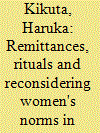

|
|
|
|
|
| Summary/Abstract |
This paper describes recent economic and social changes in Central Asian neighbourhood communities known as mahallas, using data from a town in Ferghana Valley. First, it examines how the increasing costs of life-cycle rituals are damaging the harmony of mahallas. Since 2007, more and more hosts have begun to outsource the provision of food and services for these rituals, using money acquired mostly through emigrant labour. This in turn lessens mahallas’ mutual aid practices, and reveals emerging economic disparities between neighbours. Secondly, the paper argues that emigration has had transformative effects on the lifestyles of Muslim women in mahallas. With the globalization of their economy, conventional local norms are becoming harder to obey, and some young and middle-aged women are choosing to live outside these norms. Dependence on emigrant labour and the associated remittances has significantly affected the lifestyles and morals of mahalla inhabitants.
|
|
|
|
|
|
|
|
|
|
|
|
|
|
|
|
| 9 |
ID:
144163
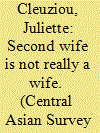

|
|
|
|
|
| Summary/Abstract |
While polygyny in Tajikistan existed before the collapse of the Soviet Union in 1991 and has been a phenomenon of growing importance since Independence, it is still forbidden by law. To understand this renewal, I do not look at polygyny as a sign of religiousness, but as a form of patriarchal bargain in which women (who often experienced former matrimonial disjuncture) may have a greater power of decision in the spousal relations. I will explore women's points of view, from which polygyny is a strategy to accessing the symbolic and material resources they lack. I then explore the conditions to which becoming a second wife is possible: women's own resources, be they material, symbolic, familial, appear as of crucial importance in this accession to the status of being married anew.
|
|
|
|
|
|
|
|
|
|
|
|
|
|
|
|
|
|
|
|
|